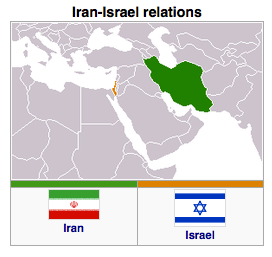Iran’s Nuclear Conundrum: Israel’s Strategic Options – Analysis
By RSIS
If Iran acquires nuclear weapons capability, Israel may no longer be able to sustain its ambiguous policy or nuclear opacity and will need to rethink its nuclear doctrine to maintain credible deterrence. To preclude this, Israel will rely on its military ingenuity and deny Iran such capability.
By Michael Raska
ISRAEL’S NUCLEAR doctrine, as enunciated by Prime Minister Menachem Begin after the 1981 annihilation of Iraq’s Osirak reactor by Israeli warplanes, is being tested three decades later. Under the so-called Begin Doctrine, Israel would under no circumstances allow the enemy to develop weapons of mass destruction against it. Nor would Israel allow itself to be the second country to introduce nuclear weapons in the Middle East. It also adopted the policy of nuclear opacity – neither admitting nor denying the possession of nuclear weapons.

Both elements of the Begin Doctrine are on the verge of another test. Concerns over Iran’s covert efforts to develop a nuclear weapon capability, a claim that Tehran denies, are shaping continuous strategic and policy debates on the pace, direction, and character of Iran’s nuclear programmes. Notwithstanding contending intelligence assessments on the actual “point of no return” when Iran would de facto cross a particular technological threshold, the prospect of a nuclear Iran opens the Pandora’s Box of nuclear proliferation in the Middle East.
Israel’s nuclear doctrine
From an Israeli perspective, the underlying essence of the Iranian threat is the increasing convergence between radical ideology, long-range missile capability, and nuclear weapons. A nuclear Iran could embolden terrorist groups into acting more aggressively vis-à-vis Israel. The sum of all fears is the possible nexus of the two – Iran providing a nuclear umbrella to its terror proxies and deliberately threatening Israel’s destruction.
Iranian efforts to develop nuclear capability may have also ignited fears in the neighbouring states; Saudi Arabia, Egypt and Turkey have plans to start their own civilian nuclear programmes under the auspices of the IAEA. Some of the Gulf Cooperation Council (GCC) countries have also inked deals with other countries and companies for setting up facilities for producing nuclear energy. At the end of 2008 the GCC authorised nuclear development for its Gulf members. The United Arab Emirates plans to build at least four nuclear energy plants in its western region, the first of which is expected to be completed by 2017.
The modalities of Iran’s “nuclear introduction” would effectively reshape Israel’s traditional strategic paradigm, and in doing so force Israel’s policymakers to reconsider the viability of the policy of nuclear opacity – the bedrock of Israel’s deterrence.
In theory, Israel will have at least four strategic options in revising its nuclear doctrine:
(1) Israel maintains a status-quo by keeping its nuclear opacity intact. Its nuclear capabilities, protective efforts, and nuclear doctrine will remain undisclosed, albeit not denied either – Israel would continue to signal that is willing and able to deliver an appropriate destructive response.
(2) Israel accepts nuclear parity, shifts to a declaratory status based on Mutually Assured Destruction (MAD). Israel declares a “ready arsenal” (launch-on warning) backed by a second-strike nuclear capability with relevant nuclear war-fighting doctrine.
(3) Israel shifts to a policy of a minimum credible deterrence in the form of a “recessed deterrence” – no first use/second strike capability. Its nuclear configuration, however, would have to guarantee the capability for a second-strike. Given Israel’s geostrategic constraints, however, this option is unlikely given the risks of preemptive first strike on Israel.
(4) Israel resorts to international arms control regime or pursues denuclearisation of the Middle East. Israel may rethink the possibility of entering regional arms-control talks, and supporting a WMD-free Middle East. This option is also unlikely in the absence of a “comprehensive peace” with Arab countries and Iran.
Preventive Use of Force
On 6 September 2007, Israel conducted a covert precision strike on Syria on what Israeli and U.S. intelligence analysts believed was a partly constructed Syrian nuclear facility, modelled on North Korean design. While the intelligence suggested that the Syrian facility was years from completion, the timing of the attack showed that Israel is determined to neutralise even a nascent nuclear project in the region.
Yet, a potential strike on selected Iranian nuclear installations would incur much greater operational risks. Iran has spread out its nuclear facilities and constructed its nuclear sites underground to protect it from conventional air strikes. Israeli military planners must calculate additional risks, including the distance of flying either over Iraqi or Turkish airspace to reach their targets; upgraded Iranian air defences, and the potential collateral damage stemming from possible nuclear radiation and contamination of the targeted area.
Moreover, there are considerable risks of Iranian retaliation such as interfering with the flow of oil through the Persian Gulf, launch of counter-attacks with conventional ballistic missiles against Israel, and mobilising its network of militant organisations such as Hezbollah or Hamas.
Going It Alone?
One of the contending views within the Israeli political-military establishment is that while preventive military action vis-a-vis Iranian nuclear facilities would inevitably carry considerable political and operational risks, inaction may yield far worse consequences.
Based on Israeli threat perceptions and historical experience, Israel may have no choice, but to deny its adversaries the capability to develop nuclear weapons. As Ehud Barak, Israel’s Defence Minister said, the prevailing lesson from Israel’s war experience has been the belief that “ultimately we [Israel] are standing alone.” This belief may essentially continue to drive Israel’s strategic choices.
Michael Raska is an Associate Research Fellow at the Institute of Defence and Strategic Studies, a constituent unit of the S. Rajaratnam School of International Studies (RSIS), Nanyang Technological University. He recently completed his Ph.D. at the Lee Kuan Yew School of Public Policy, National University of Singapore.
